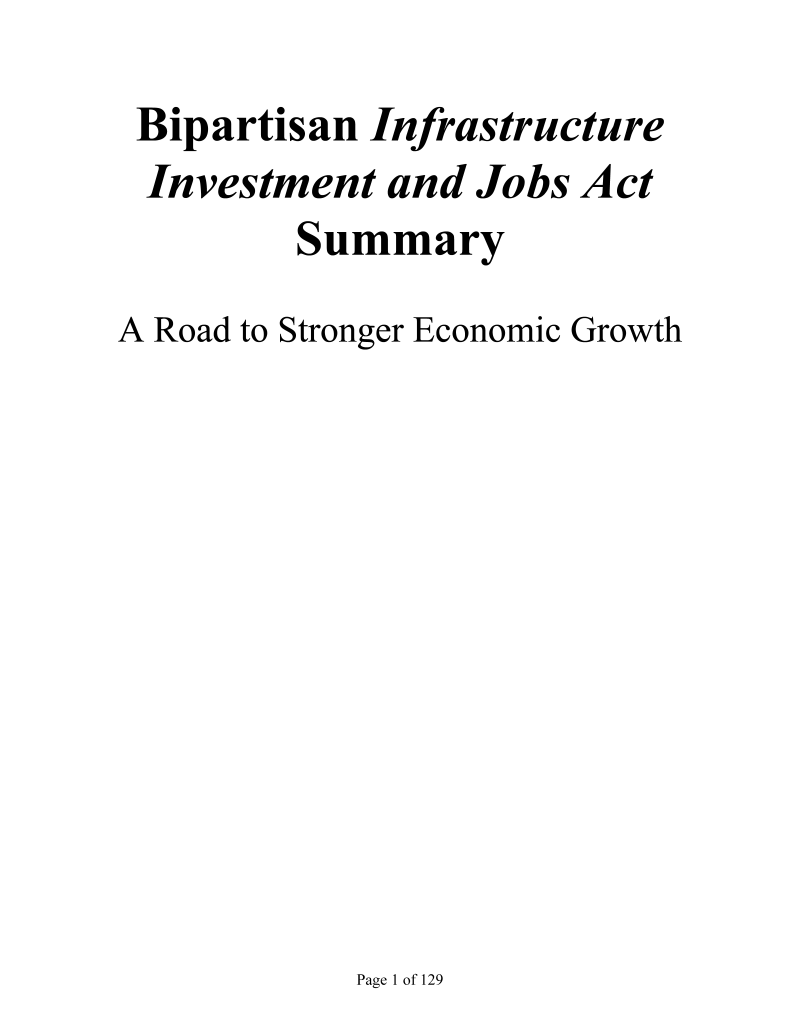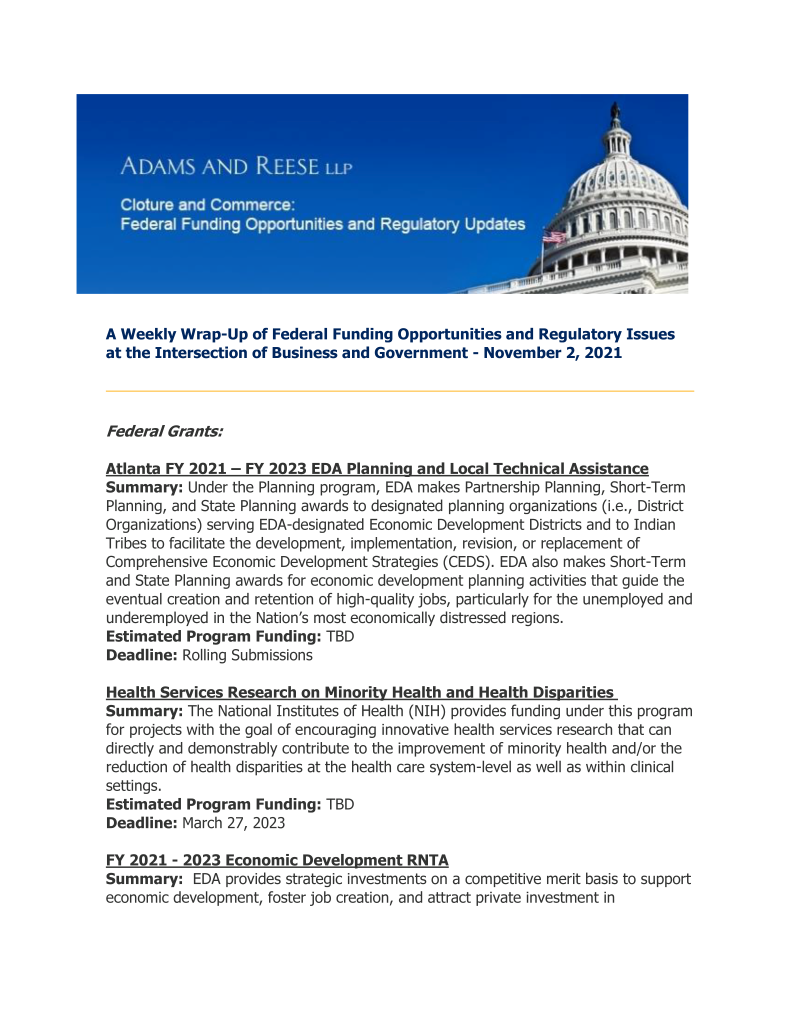|
On Friday, November 5th, the House passed H.R. 3684: The Infrastructure Investment and Jobs Act, more commonly known as the Bipartisan Infrastructure Act (BIF). It had already passed through the Senate with a 69-30 vote before being decided on in the House with a 228-206 vote. The legislation is expected to be on President Biden’s desk this week to be signed into law. The legislation will reauthorize surface transportation programs for five years and provide funding authorization for energy, water, and broadband infrastructure. It would increase spending on infrastructure by $550 billion over five years and appropriate $445.9 billion in emergency funding. This legislation is a major part of President Biden’s agenda to build stronger infrastructure while providing job opportunities. The White House released the following fact sheet on the bill. A summary report released by Senator Rob Portman can be found here, and a section-by-section released by Senator Joe Manchin can be found here. While the bill covers a myriad of infrastructural investments, the bill is centered around the reauthorization of surface transportation programs, starting with highways. According to Bloomberg Government, the following measures have been included in the bill relating to highways: Highways
Some of the most talked-about provisions in this legislation are those to do with climate. Mitigating climate change was a major talking point of President Biden’s campaign and creating resilient infrastructure was a key part of that. Part of these mitigation tactics includes encouraging a shift from traditional vehicles, powered by sources like gasoline and diesel, to electric vehicles. A tax credit for electric vehicles is included in Build Back Better Act, but the Bipartisan Infrastructure Bill is not without its own provisions towards paving the way for alternative vehicles. It also includes changes to a Trump-era policy that affected the National Environmental Policy Act. Details on what is included can be found below:
Eligibility for several federal-aid highway programs, including the National Highway Performance Program, would be expanded to include transportation resilience and extreme weather mitigation projects.
This bill authorizes close to $50 billion for rail infrastructure with $15 billion of that funding used from 2022 through 2026 for Rail Improvement Grants. It also includes a foreign freight car ban stating that freight cars manufactured one year following enactment could only operate in the U.S. if:
The measure authorizes $345 million over five years for the Pipeline and Hazardous Materials Safety Administration’s hazardous material safety programs. It also would reauthorize spending from the Hazardous Materials Emergency Preparedness Fund for the same period. It would also formally authorize the agency’s Assistance for Local Emergency Response Training (ALERT) grant program. Emergency appropriations for hazardous materials include:
The measure includes a series of research and innovation-based policies including an “Advanced Research Projects Agency-Infrastructure” (ARPA-I) would be established within the Transportation Department and would authorize “such sums as are necessary” for the program. The measure would also authorize a total of $500 million over for five years for the Strengthening Mobility and Revolutionizing Transportation (SMART) Grant Program and would establish a center within the Transportation Department to improve interagency coordination and expedite projects related to permits and environmental reviews for major transportation infrastructure projects. Aviation In terms of aviation, BIF would provide supplemental emergency appropriations for aviation programs for fiscal 2022 through 2026, including:
Multimodal and freight programs would authorize $10 billion for grants supporting infrastructure projects with national or regional significance and $7.5 billion for projects with local or regional significance or fiscal 2022 through 2026. It would also establish and authorize “such sums as are necessary” for an Office of Multimodal Freight Infrastructure and Policy at the Transportation Department, headed by a presidentially appointed assistant secretary. Water infrastructure Water infrastructure is covered through both drinking water and clean water provisions as part of this legislation. The bill would authorize over $15 billion through fiscal 2026 for drinking water infrastructure for the Drinking Water State Revolving Funds Program, Lead Reduction grant programs, and would extend the authorization for compliance assistance grants to public water systems in small and disadvantaged communities. It would authorize annual grants for leak detection, repair, and monitoring in small public and nonprofit water systems. For clean water infrastructure, over $16 billion would be authorized for the Clean Water State Revolving Funds program, Water Infrastructure Finance and Innovation Act, grants to address sewer overflows, and research grants to address water pollution. Energy infrastructure Energy infrastructure plays a major role in this infrastructure package as a shift to renewable energy and achieving net zero emissions are part of the foundation of President Biden’s agenda. Energy infrastructure has received funding for the following through BIF:
Broadband and cybersecurity have become a fundamental part of what we define as infrastructure as technology has become an essential part of most Americans’ lives. Broadband provisions in BIF include:
Included in this package are Domestic Content Provisions, most importantly the Buy America Preference which would require the iron, steel, manufactured products, and construction materials used in infrastructure projects to be produced in the U.S. Cement and aggregates such as stone, sand, and gravel, wouldn’t be covered. The bill would permit waivers to the “Buy America” preference, including if there were insufficient supplies or meeting the requirement would increase costs by more than 25%. It would also direct OMB to establish the “Made in America Office” to enforce compliance with domestic content statutes, review waiver requests, review reciprocal defense agreements with foreign governments, and report the percentage of federal procurements made in the U.S. The measure would authorize $5 billion over five years for the Environmental Protection Agency to award grants and rebates to replace school buses with zero-emission buses or buses that the EPA certifies reduces emissions and use alternative fuels. It would authorize $1 billion for the Transportation Department to establish a program to provide funding to states to ensure basic essential ferry service in rural areas and $250 million for the department to establish a pilot program to provide grants to purchase electric or low-emission ferries. Additional Emergency Appropriation BIF provides the following emergency appropriations:
We understand that this is a substantial piece of legislation with a multitude of provisions. We invite you to reach out to us should you have any difficulties or need any further information relating to this legislation. Please contact [email protected] or [email protected] for any questions or concerns you may have. Comments are closed.
|


